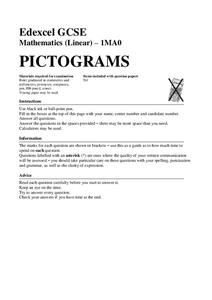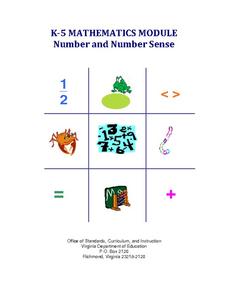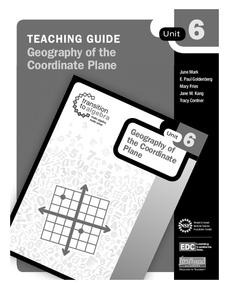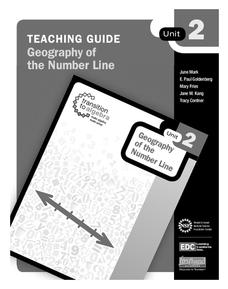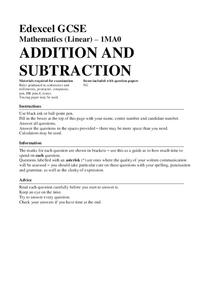Scholastic
Study Jams! Lines of Symmetry
Line up this lesson when introducing symmetry to your young mathematicians. Watch how two figures are introduced to different ways of folding and identifying whether or not they are actually symmetrical. Finish the lesson with a multiple...
Scholastic
Study Jams! Construct Angles
Practice those protracting skills while watching the step-by-step guide on the correct way to use this angle measuring tool. The resource follows with assessment questions testing their ability to understand and use the protractor...
PB Works
Prime and Composite Numbers
Start with the basics and introduce the first 24 numbers in the world of prime and composites. This graphic organizer has students list the factors and then categorize the numbers appropriately. A great way to organize information and...
Super Teacher Worksheets
Prime and Composite
Factoring is an essential component in algebra, and this worksheet prepares learners with a quick reference guide and examples. After they find all the factors, they decipher whether the number is prime or composite.
Scholastic
Study Jams! Classify Quadrilaterals
Face the vertex of two-dimensional shapes and discover what each figure requires as part of its classification. With one shape per slide, learners see what makes each shape special and compare it to others with similar qualities.
Scholastic
Study Jams! Area of a Parallelogram
Get introduced to the idea of square units and how to calculate the area of a parallelogram. The resource provides a visual lesson to measuring different types of this shape and how it relates to square units.
Mathed Up!
Pictograms
Young mathematicians read, interpret, and complete a variety of real-world pictograms. Each question includes a key and information to complete the graphs.
Curated OER
K-5 Mathematics Module: Number and Number Sense
Reinforce number sense with a collection of math lessons for kindergarteners through fifth graders. Young mathematicians take part in hands-on activities, learning games, and complete skills-based worksheets to enhance proficiency in...
Education Development Center
Geography of the Coordinate Plane
Put the graph into graphing and allow learners to understand the concept of point plotting and how it relates to data. The worksheet provides a nice way to connect data analysis to a graph and make predictions. The worksheets within the...
Education Development Center
Micro-Geography of the Number Line
Young mathematicians dive into the number line to discover decimals and how the numbers infinitely get smaller in between. They click the zoom button a few times and learn that the number line doesn't just stop at integers. Includes a...
Education Development Center
Geography of the Number Line
It's more than just numbers on a line, its an organizational, mental math machine to help learners understand the value of numbers. The tool is handy when introducing positive and negative integers to see their values and relationships....
Education Development Center
Language of Algebra
Don't rush into algebra, let learners visualize, guess, and predict their way to a successful math career. The introductory unit incorporates beginner algebraic concepts with shapes instead of variables. Young mathematicians use a...
Mathed Up!
Congruent Shapes
Are congruent shapes compatible? Congruent shapes are identical to one another, and throughout the assessment, young mathematicians identify given shapes as congruent.
Mathed Up!
Coordinates
Young graphers decide where to plot a point given a specific ordered pair. The problems vary in difficulty, beginning with simpler coordinates, and ending with plotting and connecting coordinates. Each graph is labeled with the...
Mathed Up!
Multiplication and Division
Multiplication and division of decimals by whole numbers is the focus of these assessment worksheets. Learners solve equations by showing their work in order to arrive at the correct answer.
McGraw Hill
Metric Units of Weight and Volume
Getting the right measurements can save a lot of time and money in the real world. Learners are introduced to unit conversion and how to accurately go from one unit to another. The first pages are notes and then the packet finishes with...
McGraw Hill
The Units of the English System
Go from feet to inches to yards and back again with this notes and worksheet combo resource. Several pages of examples regarding unit conversion of the English system are given, followed by different pages of problems. There is a nice...
Mathed Up!
Addition and Subtraction
After watching a brief video on addition and subtraction, young mathematicians are put to the test. Including 12 problems, individuals solve word problems to find the least number, total amount, and difference of numbers.
Mathed Up!
Shading Fractions of Rectangles
Learners find the midpoint between two numbers, shade fractional amounts of rectangles as well as decimal amounts of rectangles, and explain their mathematical reasoning in words. The assessment is a great way to check for understanding...
Mathed Up!
Negative Numbers
Individuals read tables with temperatures and times in order to distinguish the town with the lowest temperature or most extreme temperature difference. Each of the eight questions has three sub-questions that use the same charts.
Mathed Up!
Fractions of an Amount
After viewing a video on fractional amounts, young mathematicians put their new knowledge to the test. Throughout the assessment, class members find the fractional amount for prices, times, and populations. There are a few percent and...
Mathed Up!
Reading Scales
After watching a video on how to read different types of scales, young mathematicians complete eight problems involving scales. From thermometers to number lines to rulers and clock, class members identify various numbers on scales.
Mathed Up!
Ordering Numbers
Young mathematicians order numbers from least to greatest. Number types include whole numbers, decimals, and negative numbers.
Mathed Up!
Place Value
Prompt class members to find the value of various digits, and to write numbers in standard form and written form. Pupils also round multi-digit numbers to the nearest hundred and thousand.





